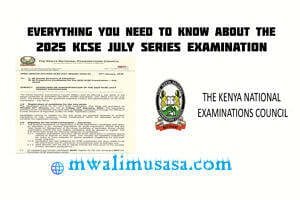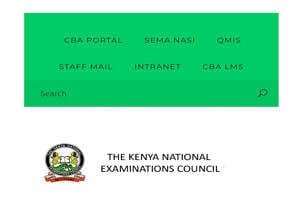Revealed: KNEC’s 2.8 Million Payment to Ghost Examiners in 2022 KCSE Examinations

Introduction to the KNEC Audit
The audit conducted by the Kenya National Examinations Council (KNEC) arose in the context of increasing concerns regarding the management and distribution of funds within the organization. With allegations surfacing about misappropriated payments, particularly to individuals falsely claiming to be examiners, a thorough examination of the financial records and processes became imperative. The key objective of this audit was to identify discrepancies in the payment systems and ensure accountability in the utilization of public funds allocated for the Kenya Certificate of Secondary Education (KCSE) examinations.
The audit engaged various stakeholders, including auditors from the Office of the Auditor-General, educational experts, and representatives from the Ministry of Education. Their collaboration aimed to establish a comprehensive understanding of KNEC’s financial operations, enhancing transparency and trustworthiness within the institution. Through the examination of payment records, and adherence to established guidelines, the audit sought to uncover the extent of the financial irregularities and determine responsible parties involved in the ghost examiner scheme.
These findings are particularly significant as they hold implications for the integrity of national examinations in Kenya. The presence of ghost examiners not only compromises the credibility of the examination process but also undermines the educational system as a whole. As a result of the audit, KNEC aims to implement stricter controls and ensure that only qualified and legitimate individuals are engaged in future examination processes. This investigation thus serves as a crucial step toward restoring public confidence in KNEC and ensuring that resources are directed toward legitimate educational initiatives.
The Findings of the Audit
The recent audit conducted by the Ministry of Education has brought to light a troubling narrative regarding the Kenya National Examinations Council (KNEC) and its financial disbursements during the 2022 Kenya Certificate of Secondary Education (KCSE) examinations. A staggering sum of 2.8 million shillings was reportedly disbursed to 203 individuals later identified as ghost examiners. This revelation raises critical questions about the processes in place for verifying the identities and responsibilities of examination personnel.
The audit findings indicate that these ghost examiners had either never participated in the examination process or were fictitious entities created to siphon funds. The identification of such discrepancies involved a thorough review of the records associated with their appointment and payment. Officials scrutinized not only the payments but also the roles these supposed examiners were meant to fulfill, revealing a systemic failure in verification protocols.
Additionally, the audit highlighted the absence of a robust tracking mechanism within KNEC that could prevent such fraudulent activities. The findings emphasize the need for an overhaul of the recruitment and payment processes associated with examination personnel. Without stringent checks and balances, financial resources intended for legitimate examiners may continue to be misappropriated, undermining the integrity of the education system.
The implications of these findings are profound. They not only impact the image of KNEC but also raise concerns among stakeholders, including parents, students, and educational institutions. Trust in the examination process hinges on transparency and accountability, both of which have been called into question due to these events. Initiatives aimed at reforming KNEC’s operational frameworks will be essential to restore confidence and ensure that such incidents are not repeated in the future.
Understanding Ghost Examiners
The term ‘ghost examiners’ refers to individuals who are listed as examiners for educational assessments but do not actually carry out the responsibilities associated with that role. These individuals may exist in records without ever participating in the examination process. This phenomenon raises serious concerns regarding the integrity and transparency of educational assessments, particularly within national examinations, such as the Kenya Certificate of Secondary Education (KCSE).
Several factors contribute to the existence of ghost examiners. One primary reason is the mismanagement and lack of proper oversight within the examination bodies. In some cases, individuals may be added to the examination roster due to nepotism, corruption, or administrative errors. Moreover, the absence of rigorous verification processes allows these ghost examiners to remain undetected, raising questions about the reliability of the examination system. This troubling trend signifies not only a waste of resources but also erodes public trust in educational institutions.
The presence of ghost examiners can have far-reaching implications on the overall quality of education and assessment. When designated examiners do not fulfill their duties, it compromises the evaluation process, which is critical for maintaining academic standards and fairness. This can result in inaccurate grading, which, in turn, affects students’ academic records and future opportunities. Furthermore, the knowledge that ghost examiners exist may lead to a public perception that examination results are not a true reflection of student performance, damaging the credibility of the certification process.
In summary, the phenomenon of ghost examiners is a significant issue within the educational assessment landscape. It highlights the need for thorough checks and balances to ensure that examination processes are fair, transparent, and accountable. Addressing this issue is vital for restoring confidence in educational assessments and ensuring that all legitimate examiners carry out their roles effectively.
The Impact on Students and Education
The revelation of KNEC’s 2.8 million payment to ghost examiners during the 2022 KCSE examinations sheds light on a significant issue affecting the integrity of academic assessments in Kenya. Ghost examiners, individuals who do not exist or are not qualified, undermine the credibility of examination processes, leading to various adverse effects on students and the education system at large. The reliance on such unqualified personnel can lead to misallocation of resources and compromised evaluation standards, which ultimately impacts the quality of education.
Students rely on fair and accurate assessments to determine their academic progression and future opportunities. The presence of ghost examiners means that some students may receive inflated or inaccurate grades, potentially skewing their performances. This lack of transparency can lead to disillusionment among students, who may feel that their hard work and effort are undermined by the presence of dishonest practices within the examination system. Furthermore, it raises questions in the minds of students regarding the equity of their educational experiences, as those benefiting from corrupt practices may not reflect genuine merit.
Moreover, the implications extend beyond just individual students; they affect the public trust in the educational system itself. Parents and stakeholders begin to lose confidence in the integrity of assessments, forcing them to question the very foundation of the education system. This distrust can lead to increased scrutiny and skepticism surrounding educational qualifications, ultimately harming the reputation of institutions and diminishing the value of diplomas and certificates issued.
In conclusion, the involvement of ghost examiners in the KCSE examinations is a critical issue that compromises students’ academic integrity and undermines public trust in the educational framework. Addressing this problem is essential to ensuring a fair, transparent, and credible assessment process for all students in the future.
KNEC’s Response and Actions Taken
The Kenya National Examinations Council (KNEC) has acknowledged the audit findings regarding payments made to ghost examiners during the 2022 Kenya Certificate of Secondary Education (KCSE) examinations. In light of these allegations, KNEC has embarked on a comprehensive review of its operational protocols to ensure the integrity of its examination processes. Their commitment to maintaining a transparent and accountable system is evident in the series of actions they are implementing.
Firstly, KNEC has initiated a thorough investigation aimed at identifying the exact channels through which ghost examiners infiltrated the payment system. This investigation is expected to involve collaboration with relevant law enforcement agencies to pursue legal proceedings against individuals found to be implicated in this malpractice. Furthermore, KNEC is taking a proactive approach by engaging both internal and external auditors to monitor the disbursement processes associated with examiner remuneration.
In addition to these investigative measures, KNEC has announced plans to revise and strengthen its vetting processes for examiners. By implementing stricter background checks and enhancing the criteria for examiner recruitment, KNEC aims to significantly reduce the chances of such occurrences in future examinations. Policies regarding the appointment and oversight of examiners are also under review, ensuring that each examiner’s qualifications and credentials are rigorously verified before their engagement.
KNEC’s leadership has emphasized the importance of disciplinary actions against any employees or collaborators found complicit in the ghost examiner payments. This may include termination of contracts and potential legal action. The council’s public announcements suggest a commitment to maintaining educational standards and restoring public confidence in the examination system. Moving forward, KNEC’s focus will be on ensuring that such irregularities do not recur, thus safeguarding the future of academics in Kenya.
Legal and Ethical Implications
The revelation that the Kenya National Examinations Council (KNEC) disbursed 2.8 million Kenya Shillings to ghost examiners during the 2022 Kenya Certificate of Secondary Education (KCSE) examinations raises significant legal and ethical concerns. Firstly, from a legal standpoint, such discrepancies undermine the integrity of the examination process, suggesting potential violations of established policies and regulations governing educational assessments in Kenya. If it is determined that KNEC knowingly engaged with fictitious examiners or failed to implement adequate verification measures, it may face legal repercussions, including investigations and possible litigation from stakeholders affected by the compromised examinations.
Moreover, the implications extend beyond legal consequences to profound ethical considerations. KNEC holds a fiduciary responsibility to ensure fairness, transparency, and accountability in its operations, particularly in sensitive areas such as examination processes. The existence of ghost examiners not only compromises the validity of the examination outcomes but also erodes public trust in educational institutions. Stakeholders, including students, parents, and educators, depend on KNEC to uphold high standards and ensure that results genuinely reflect student capabilities.
Addressing these issues necessitates comprehensive internal audits and an overhaul of KNEC’s operational protocols. The council must adopt stringent measures to prevent the recurrence of such unethical practices. Furthermore, public communication about the steps taken to rectify these issues is crucial to restoring confidence in KNEC. In light of these findings, it becomes clear that KNEC must navigate both the legal ramifications and the ethical obligations that arise, ensuring that their commitment to integrity and transparency is prioritized in all future examinations.
Public Reaction and Media Coverage
The recent revelations regarding the Kenya National Examinations Council (KNEC) payments to ghost examiners during the 2022 KCSE examinations have sparked widespread outrage and concern among various stakeholders. Parents, educators, and officials from the government have expressed their views, with many calling for accountability and transparency within the examination body. The idea that public funds, amounting to 2.8 million, could be misappropriated in such a manner raises questions about the integrity of the examination system itself.
Educators have openly criticized KNEC, emphasizing the potential harm that such malpractice inflicts on the educational system and the credibility of national examinations. They argue that the findings not only undermine the hard work of legitimate examiners but also have broader implications on students’ futures. Many educators have taken to social media to voice their dissatisfaction, stating that trust in the examination process has been severely eroded due to these startling revelations. The consensus among educators and academic stakeholders is that immediate reforms are necessary to restore confidence in the examination process.
Media coverage of the issue has been extensive, with various news outlets highlighting the findings of the audit. Journalists have conducted interviews with key stakeholders, unearthing multiple viewpoints on the ramifications of these allegations. Editorials and opinion pieces have also emerged, calling for systemic changes within KNEC to prevent such occurrences in the future. Additionally, calls for legislative oversight and stricter regulations on examination processes have gained traction as stakeholders seek to implement safeguards against future misconduct.
The outcry has also extended to social media platforms, where hashtags related to KNEC and the ghost examiner scandal have trended. Citizens have utilized these platforms to demand accountability from KNEC and to urge the government to take decisive action against those involved in the mismanagement of funds. As public awareness continues to grow, the pressure on KNEC to address these concerns intensifies.
Lessons Learned and Future Recommendations
The recent audit revealing a payment of 2.8 million to ghost examiners during the 2022 KCSE examinations underscores significant lessons for the Kenya National Examinations Council (KNEC) and other examination bodies. The integrity of educational assessments is paramount, and this incident highlights the need for a comprehensive review of existing procedures. One of the critical lessons learned is the importance of vigilance in monitoring the entire examination process. This includes the careful selection and verification of examiners to ensure that those entrusted with such responsibilities are legitimate and qualified.
Moreover, the establishment of robust validation systems is essential. KNEC should adopt technology-driven solutions that can facilitate real-time tracking of examiner appointments and payments. Implementing biometric systems or digital signatures could serve as effective measures to authenticate examiner identities and their participation in the examination process. Such innovations would significantly reduce the risk of fraudulent activities and ensure accountability.
Transparency stands out as another vital component in maintaining the integrity of examinations. KNEC must prioritize clear communication regarding the selection criteria for examiners and the processes in place for monitoring their activities. Stakeholder involvement, including teachers and parent associations, can foster an environment of openness and trust. By engaging these groups, KNEC can enhance its credibility and deter potential malpractice.
Finally, continuous training and awareness programs for all personnel involved in the examination process could reinforce these measures. Educating stakeholders about the repercussions of examination fraud and the importance of integrity within the educational framework will cultivate a culture of responsibility and ethical behavior. In conclusion, by implementing these recommendations, KNEC and similar bodies can better safeguard the integrity of their examination processes and prevent future occurrences of fraud.
Conclusion: The Path Forward
The revelations concerning KNEC’s 2.8 million payment to ghost examiners during the 2022 KCSE examinations underscore the pressing need for reforms within the education sector. This situation not only raises concerns regarding the integrity of the examination process but also highlights the broader issues related to accountability and transparency in educational assessments. The findings from the audit serve as a wake-up call, urging stakeholders to take decisive action against fraudulent activities that undermine the efforts of genuine educators and the value of qualifications acquired by students.
Collective action is essential to rectify the identified shortcomings. Government bodies must prioritize the formulation and enforcement of stringent policies aimed at curbing malpractice in examination procedures. This includes not only auditing existing practices but also establishing a transparent framework to monitor and evaluate the roles of examiners effectively. Education stakeholders, including teachers, parents, and community leaders, should also play an active role in advocating for reforms that foster integrity in the academic landscape. Open channels of communication and cooperation between these groups can facilitate a more robust system that discourages fraudulent behaviors.
Furthermore, it is crucial for society to reap the benefits of a fair education system. Implementing educational reforms requires a foundational understanding of the significant impact that exam integrity has on students’ futures. Through enhancing the examination framework, fostering a culture of honesty, and promoting ethical practices, we can ensure that educational attainments are reflective of students’ true capabilities. Sustained efforts by all involved parties will be necessary for creating an environment where genuine merit is recognized and rewarded, safeguarding the sanctity of education for future generations. With determined collaboration, it remains possible to pave the way towards a more equitable and trustworthy educational system.








